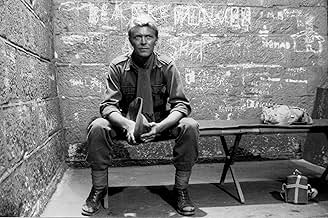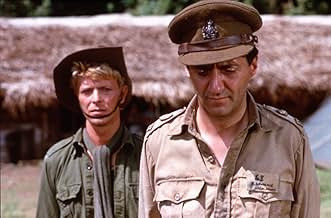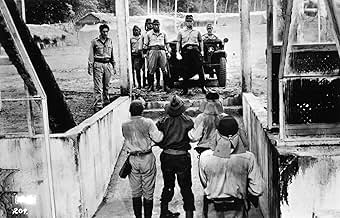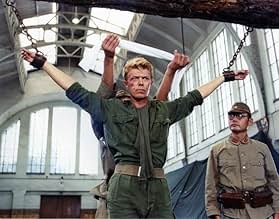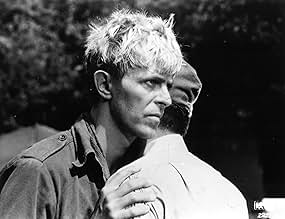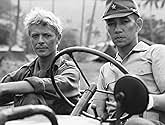IMDb रेटिंग
7.2/10
21 हज़ार
आपकी रेटिंग
अपनी भाषा में प्लॉट जोड़ेंDuring WWII, a British colonel tries to bridge the cultural divides between a British POW and the Japanese camp commander in order to avoid bloodshed.During WWII, a British colonel tries to bridge the cultural divides between a British POW and the Japanese camp commander in order to avoid bloodshed.During WWII, a British colonel tries to bridge the cultural divides between a British POW and the Japanese camp commander in order to avoid bloodshed.
- निर्देशक
- लेखक
- स्टार
- 1 BAFTA अवार्ड जीते गए
- 10 जीत और कुल 8 नामांकन
Takeshi Kitano
- Hara
- (as Takeshi)
Johnny Ôkura
- Kanemoto
- (as Johnny Ohkura)
Yûya Uchida
- Commandant of Military Prison
- (as Yuya Uchida)
Ryûnosuke Kaneda
- President of the Court
- (as Ryunosuke Kaneda)
Takashi Naitô
- Lieutenant Iwata
- (as Takashi Naito)
Rokkô Toura
- Interpreter
- (as Rokko Toura)
Yûji Honma
- PFC Yajima
- (as Yuji Honma)
फ़ीचर्ड समीक्षाएं
Do not mistake this masterpiece for a Capra Christmas movie. It is a war film without action (but with atrocities) that opens your eyes and is incredibly versatile and therefore applicable to any war that knows a winner and a loser.
The story is completely about perspectives and motives: power-madness and despair. Some might find MCML hard to stomach while watching, some afterwards. But I say you have to watch it through to appreciate the concepts fully. Moreover, I say you shouldn't vote it before you've seen all of it; that way the rating wouldn't be as low as 6.9. MCML is one of those films that surpass movies like 'Platoon' (Stone, 1986) on any level. Added to all that, it's also beautifully shot by cinematographer Toichiro Naroshima (Double Suicide).
One of the best scores in history of cinema by Ryuichi Sakamoto (also 'Wild Palms' and 'Sheltering Sky'), who not only provides it with his strokes of musical genius, but also plays an important role: the androgynous and curious captain in contrast to the virility of Takeshi Kitano (dir and acted Violent Cop, Brother, Hana Bi) the self-confident and straight-forward sergeant. If you've seen any of Kitano's movies, his character in MCML will gain from that. I guess director Nagisa Oshima (Naked Youth, Gohatto) likes to play with feminine and masculine characters. David Bowie fits in brilliantly from that perspective. His character is the most complex and worked out the deepest. My opinion is that this is his best and most intriguing role so far ('the Man who fell to earth' came close). Conti ('If we'll do it, he'll do it') plays a key figure between the Japanese and the POW.
On which side to lose a war? When to intimidate and when to be intimidated?
Which side are you on anyway? 'There are times victory is very hard to take' - Colonel John Lawrence. Not without reason sergeant Gengo Hara says 'Merry Christmas Mr. Lawrence' not: 'Merry Christmas Colonel Lawrence'. Are you intimidated by an initiation? Or still not when you're POW and the only free part of your body is your head? These are questions the film raises. Unfortunately I can't compare the film to the book, because I haven't read it. MCML is immensely powerful, and really underrated. 10/10
The story is completely about perspectives and motives: power-madness and despair. Some might find MCML hard to stomach while watching, some afterwards. But I say you have to watch it through to appreciate the concepts fully. Moreover, I say you shouldn't vote it before you've seen all of it; that way the rating wouldn't be as low as 6.9. MCML is one of those films that surpass movies like 'Platoon' (Stone, 1986) on any level. Added to all that, it's also beautifully shot by cinematographer Toichiro Naroshima (Double Suicide).
One of the best scores in history of cinema by Ryuichi Sakamoto (also 'Wild Palms' and 'Sheltering Sky'), who not only provides it with his strokes of musical genius, but also plays an important role: the androgynous and curious captain in contrast to the virility of Takeshi Kitano (dir and acted Violent Cop, Brother, Hana Bi) the self-confident and straight-forward sergeant. If you've seen any of Kitano's movies, his character in MCML will gain from that. I guess director Nagisa Oshima (Naked Youth, Gohatto) likes to play with feminine and masculine characters. David Bowie fits in brilliantly from that perspective. His character is the most complex and worked out the deepest. My opinion is that this is his best and most intriguing role so far ('the Man who fell to earth' came close). Conti ('If we'll do it, he'll do it') plays a key figure between the Japanese and the POW.
On which side to lose a war? When to intimidate and when to be intimidated?
Which side are you on anyway? 'There are times victory is very hard to take' - Colonel John Lawrence. Not without reason sergeant Gengo Hara says 'Merry Christmas Mr. Lawrence' not: 'Merry Christmas Colonel Lawrence'. Are you intimidated by an initiation? Or still not when you're POW and the only free part of your body is your head? These are questions the film raises. Unfortunately I can't compare the film to the book, because I haven't read it. MCML is immensely powerful, and really underrated. 10/10
I have to applaud and second the reviewer who gives this film 10/10 and who thinks the current 6.9 average must be a result of many people not watching to the end. I think it's the result of many viewers not appreciating the art, subtlety, and deeply UNnationalistic message. In a country rife with jingoism, the message that no one is "right" when waging war (and especially commiting atrocity)will not be especially popular. After living three years in Japan, I can understand how American (and indeed Western)independence and confidence can be perceived as(and even sometimes are)arrogance and ethonocentricity.
The movie looks at what it means to be human and afraid. It examines how shame and cowardice haunt most men of noble heart. It reveals our commonalities to be undeniably more powerful and real than our transitory differences. It shows how truly stupid man must be to perpetuate the horrors of warfare and to mar his soul by using power to hurt others.
It's a 10/10 in my book, but realistically speaking, if most people agreed, well, there wouldn't be any grist for this mill.
The movie looks at what it means to be human and afraid. It examines how shame and cowardice haunt most men of noble heart. It reveals our commonalities to be undeniably more powerful and real than our transitory differences. It shows how truly stupid man must be to perpetuate the horrors of warfare and to mar his soul by using power to hurt others.
It's a 10/10 in my book, but realistically speaking, if most people agreed, well, there wouldn't be any grist for this mill.
SPOILER: I saw this movie when it came out more than 17 years ago. At the time a big deal was made about David Bowie being in it. He is, and does a fine job, but the movie isn't about his character. It is far more about the differences between East and West, and the cruelty of war. I was able to see it again last week on a cable channel.
To fully appreciate MCMR, try to understand the culture of both the captors and the prisoners at the time. To the prisoners, their existence in the camp is an unfortunate result of war, and should be temporary and not a life or death experience. To the Japanese captors, the prisoners who surrendered rather than died fighting are cowards, beneath the notice of the captors and likely not even viewed as human beings. They are expendable. But first, in this particular camp, there is an effort to "educate" the prisoners about the way a *true* warrior lives life (and dies). That is where the true conflict begins.
There are multiple physical and psychological struggles going on in MCMR. There is even some homoeroticism, though it isn't fully explained. There is certainly a lot of sadness, for characters on both sides. This point is brought home at the end, when the roles are reversed for two of the characters.
Even today, I can hum several parts of the score to MCMR, and they make me melancholy as I recall scenes from the movie. If you like movies that delve into the darker side of the human spirit (with some lightness thrown in), check out MCML. I rated it an 8.
To fully appreciate MCMR, try to understand the culture of both the captors and the prisoners at the time. To the prisoners, their existence in the camp is an unfortunate result of war, and should be temporary and not a life or death experience. To the Japanese captors, the prisoners who surrendered rather than died fighting are cowards, beneath the notice of the captors and likely not even viewed as human beings. They are expendable. But first, in this particular camp, there is an effort to "educate" the prisoners about the way a *true* warrior lives life (and dies). That is where the true conflict begins.
There are multiple physical and psychological struggles going on in MCMR. There is even some homoeroticism, though it isn't fully explained. There is certainly a lot of sadness, for characters on both sides. This point is brought home at the end, when the roles are reversed for two of the characters.
Even today, I can hum several parts of the score to MCMR, and they make me melancholy as I recall scenes from the movie. If you like movies that delve into the darker side of the human spirit (with some lightness thrown in), check out MCML. I rated it an 8.
10Inakaguy
I remembered watching this movie when I was younger and it affecting me a lot. Well, I re-watched it recently and it has lost none of it's power.
The acting in the movie is adequate without ever being great (the notable exception being Tom Conti who is fantastic in his role as the misunderstood titular character).
However, the movie moves beyond the acting and once you are embroiled in the atmosphere and realism you become oblivious to any acting shortcomings.
The movie must be one of the most accurate depictions of human nature in a war. It has a diverse range of characters yet none of them becomes a caricature. It certainly doesn't sink into the good vs evil mindset that many war movies do.
The violence is graphic and shocking despite lacking the visceral realism of Spielberg's later war movies.
The ending of the movie still affects me, even after repeated viewings. I still have to a lump or two to stop from crying even now.
Overall, recommended for anyone with an interest in a non-stereotypical movie about war. Not for the faint of heart though.
The acting in the movie is adequate without ever being great (the notable exception being Tom Conti who is fantastic in his role as the misunderstood titular character).
However, the movie moves beyond the acting and once you are embroiled in the atmosphere and realism you become oblivious to any acting shortcomings.
The movie must be one of the most accurate depictions of human nature in a war. It has a diverse range of characters yet none of them becomes a caricature. It certainly doesn't sink into the good vs evil mindset that many war movies do.
The violence is graphic and shocking despite lacking the visceral realism of Spielberg's later war movies.
The ending of the movie still affects me, even after repeated viewings. I still have to a lump or two to stop from crying even now.
Overall, recommended for anyone with an interest in a non-stereotypical movie about war. Not for the faint of heart though.
David Bowie appears on the cover of this film, in spite of having one of the smaller major roles. After you see the movie you no longer question his presence there. His performance is magnificent. Watch for the understated behaviour regarding the flower.
This film is memorable because of a tremendous cast (including Jack Thompson- who keeps popping up in war movies) and a wonderful soundtrack by Ryuichi Sakamoto, who also performs in the movie. The soundtrack captures the jungle feeling, coupled with Japanese moods. Forbidden colours (song) has been known to give me goosebumps.
Very much, not your average War movie, _Merry Christmas Mister Lawrence_ is excellent because it portrays the relationship between captor and captive, victor and defeated. It's a movie about human spirit and love under dangerous circumstances! It's a movie about discipline and honour, especially the different way these are perceived.
This film is memorable because of a tremendous cast (including Jack Thompson- who keeps popping up in war movies) and a wonderful soundtrack by Ryuichi Sakamoto, who also performs in the movie. The soundtrack captures the jungle feeling, coupled with Japanese moods. Forbidden colours (song) has been known to give me goosebumps.
Very much, not your average War movie, _Merry Christmas Mister Lawrence_ is excellent because it portrays the relationship between captor and captive, victor and defeated. It's a movie about human spirit and love under dangerous circumstances! It's a movie about discipline and honour, especially the different way these are perceived.
क्या आपको पता है
- ट्रिवियाAccording to David Bowie, Nagisa Ôshima directed the Japanese actors with great detail. But when it came to the British actors, they were told to "do whatever it is you people do".
- गूफ़In the final scene in the prison cell, the cross belt of Lt Col Lawrence's Sam Browne is fitted back to front.
- भाव
Col. John Lawrence: You are the victim of men who think they are right... Just as one day you and captain Yonoi believed absolutely that you were right. And the truth is of course that nobody is right...
- कनेक्शनFeatured in David Sylvian & Ryuichi Sakamoto: Forbidden Colours (1983)
- साउंडट्रैकRide, Ride, Ride (Celliers' Brother's Song)
Composed by Stephen McCurdy
टॉप पसंद
रेटिंग देने के लिए साइन-इन करें और वैयक्तिकृत सुझावों के लिए वॉचलिस्ट करें
- How long is Merry Christmas Mr. Lawrence?Alexa द्वारा संचालित
विवरण
- रिलीज़ की तारीख़
- कंट्री ऑफ़ ओरिजिन
- भाषाएं
- इस रूप में भी जाना जाता है
- Merry Christmas Mr. Lawrence
- फ़िल्माने की जगहें
- Rarotonga, Cook Islands(prisoners camp in Java)
- उत्पादन कंपनियां
- IMDbPro पर और कंपनी क्रेडिट देखें
बॉक्स ऑफ़िस
- US और कनाडा में सकल
- $23,06,560
- US और कनाडा में पहले सप्ताह में कुल कमाई
- $99,221
- 28 अग॰ 1983
- दुनिया भर में सकल
- $23,76,612
- चलने की अवधि2 घंटे 3 मिनट
- रंग
- ध्वनि मिश्रण
- पक्ष अनुपात
- 1.85 : 1
इस पेज में योगदान दें
किसी बदलाव का सुझाव दें या अनुपलब्ध कॉन्टेंट जोड़ें

टॉप गैप
By what name was मेरी क्रिसमस, Mr. सॉरेन्स (1983) officially released in India in English?
जवाब

